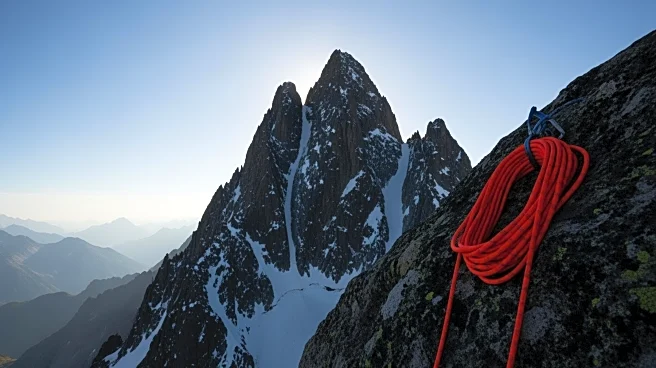What's Happening?
Rescue teams in Nepal are actively searching for the bodies of seven climbers who were killed by an avalanche on Mt. Yalung Ri. The avalanche struck the base camp, located at 16,000 feet, on Monday morning. Due to snowstorms, rescuers were unable to reach
the site immediately, but improved weather conditions on Tuesday allowed a helicopter to land with rescue personnel. Eight injured climbers, including three French and five Nepali nationals, were airlifted to Kathmandu for medical treatment. Among the deceased are two Nepali mountain guides, while the identities of the remaining victims are still being confirmed. Isabelle Solange Thaon, a survivor, recounted her experience, noting the loss of her husband, Christian Manfred, during the incident.
Why It's Important?
This tragic event highlights the inherent risks associated with mountaineering, even on peaks considered suitable for novice climbers like Mt. Yalung Ri. The incident underscores the need for enhanced safety measures and preparedness for natural disasters in high-altitude expeditions. The loss of life, including experienced guides, emphasizes the unpredictable nature of mountain environments. The international aspect, with climbers from different countries involved, also points to the global nature of mountaineering tourism and the shared responsibility for safety standards across nations.
What's Next?
Rescue operations are expected to continue as authorities work to recover the remaining bodies and provide support to the survivors. The incident may prompt discussions within the mountaineering community and among regulatory bodies in Nepal regarding safety protocols and emergency response strategies. There could be increased scrutiny on the preparedness of climbing expeditions and the adequacy of current safety measures to prevent similar tragedies in the future.
Beyond the Headlines
The avalanche on Mt. Yalung Ri may lead to broader discussions about the impact of climate change on mountain environments, potentially increasing the frequency and severity of such natural disasters. This could influence future policies on environmental conservation and sustainable tourism practices in the region. Additionally, the emotional and psychological impact on survivors and the families of the victims will likely be profound, necessitating support and counseling services.
















